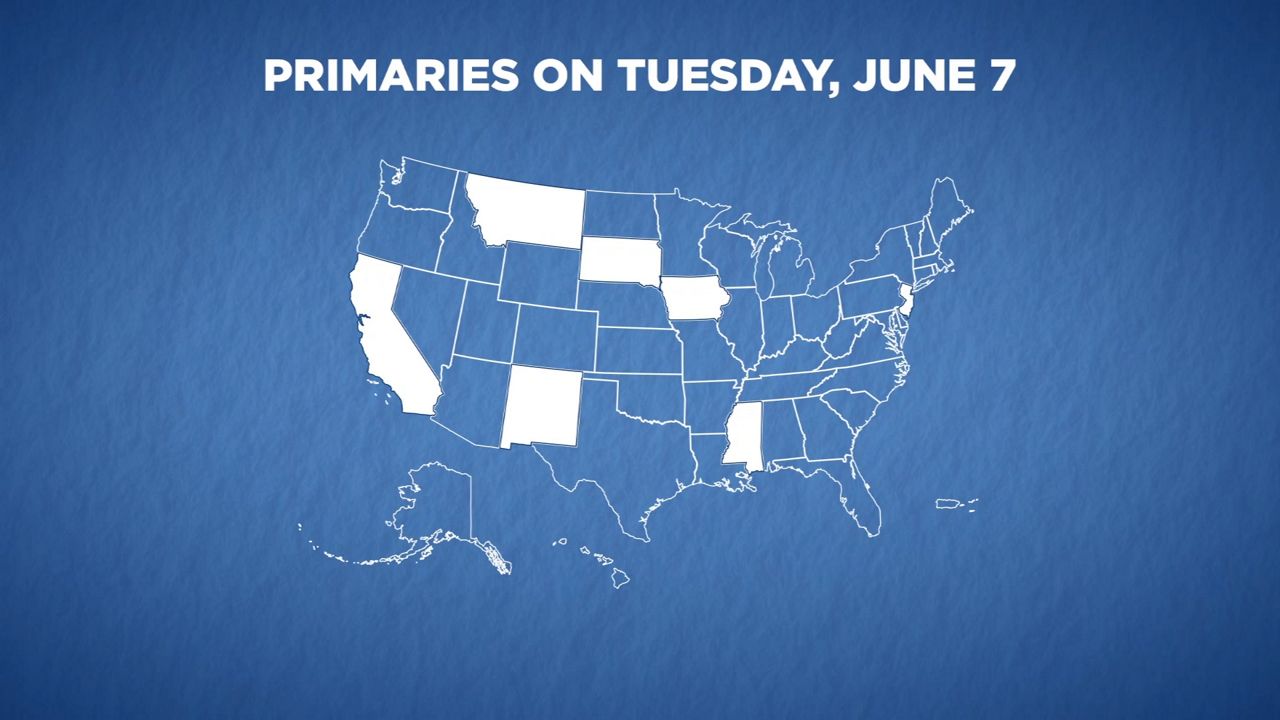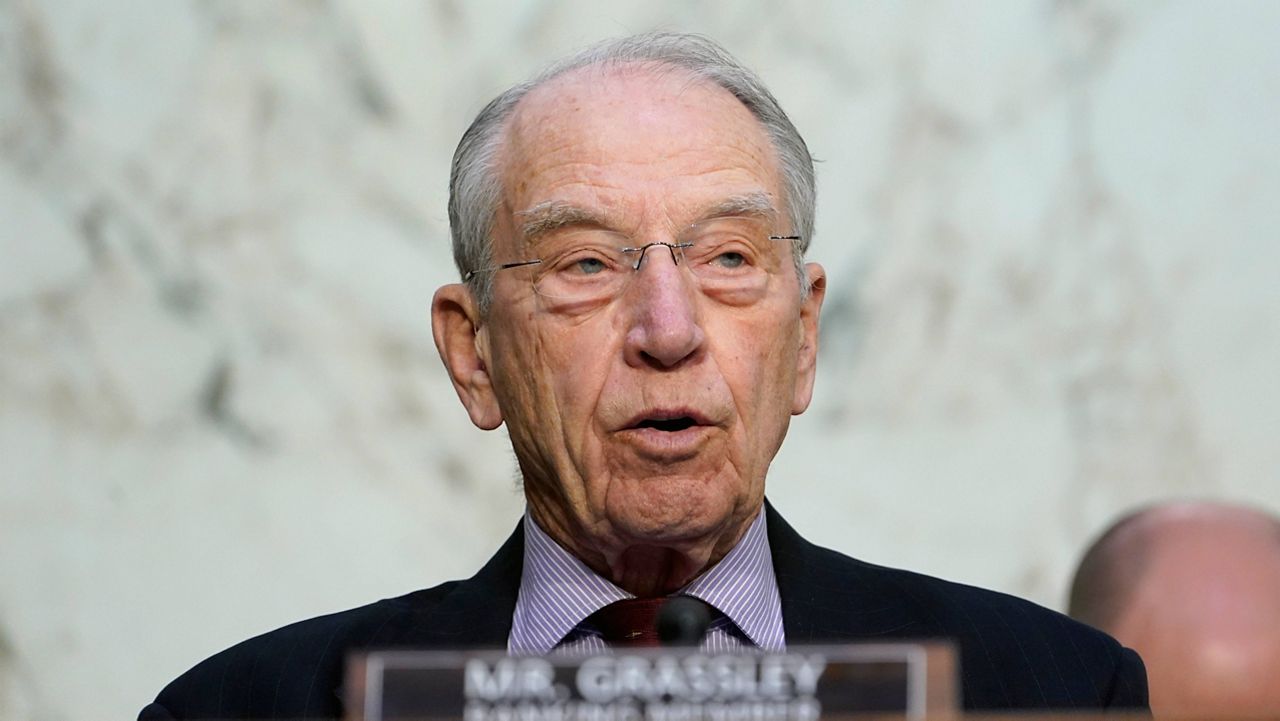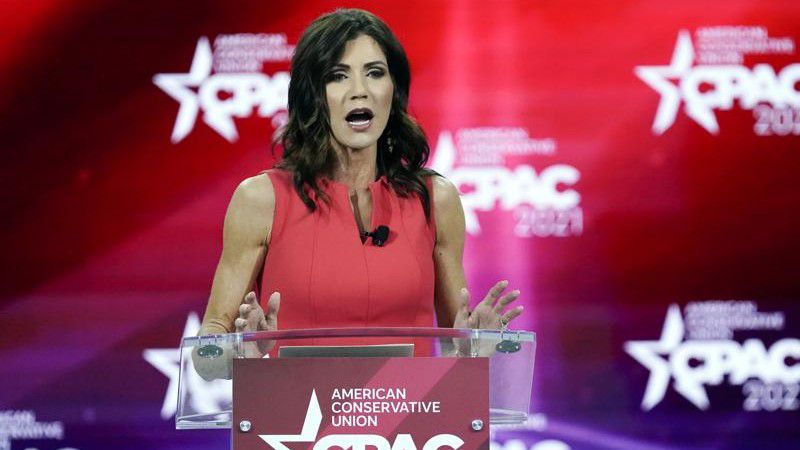Tuesday is one of the busiest primary days of the year, with voters in seven states headed to the polls.
What You Need To Know
- Tuesday is one of the busiest primary days of the year, with voters in seven states headed to the polls
- Voters in seven states -- California, Iowa, Mississippi, Montana, New Jersey, New Mexico and South Dakota -- will head to the polls
- The races include four states electing governors and three voting on U.S. Senate seats
- As Republicans look to take control of Congress, House races in New Jersey and Iowa will be critical
The races include four states electing governors and three voting on U.S. Senate seats. And as Republicans look to take control of Congress, House races in New Jersey and Iowa will be critical.

Here is a look at the top races in California, Iowa, Mississippi, Montana, New Jersey, New Mexico and South Dakota.
California
California voters are casting their ballots on the same Senate seat twice Tuesday.
Gov. Gavin Newsom appointed Sen. Alex Padilla to replace Kamala Harris last year when Harris became vice president. Padilla is running in a special election to keep that seat for the remainder of Harris’ term — until Jan. 3 — while also seeking a full six-year term.
A University of California, Berkeley poll last week showed Padilla with wide leads in the both races in a state where Democrats outnumber Republicans 2-to-1.
California uses a top-two primary format, meaning the two candidates who receive the most votes, regardless of party affiliation, will advance to the general election. Despite that, Padilla is likely to face a Republican in November — constitutional attorney Mark Meuser is polling second.
The Golden State is using a new congressional map this year after the Census count led to it losing one House seat — it will have 52 starting next year. Democrats currently represent 42 districts, Republicans control 10, and one is vacant.
According to the Cook Political Report, three of those House districts are rated “toss-ups.” And all three having something in common: They have Republican incumbents running in left-leaning districts, giving Democrats a chance to steal some seats as they try to cling to the majority.
David Valadao, one of 10 Republicans who voted to impeach former President Donald Trump over the Jan. 6, 2021, insurrection, is seeking reelection in the 22nd District in the Central Valley; Mike Garcia is running for another term in the 27th District in the northern Los Angeles suburbs; and incumbent Michelle Steel is running in the Orange County-based 45th District.
Meanwhile, nine months after surviving a recall election, Newsom appears poised to win a second term as governor. University of California, Berkeley’s poll last week showed the Democratic incumbent with 50% support from likely voters, far ahead of his biggest competition, Republican state Sen. Brian Dahle, who was polling at 10%.
New Jersey
Incumbents are seeking reelection in 11 of New Jersey’s 12 congressional districts, with retiring Democrat Rep. Albio Sires being the exception.
Democrats currently hold 10 of those 12 House seats, as well as both U.S. Senate seats, the offices of governor, secretary of state and attorney general, and both chambers of the state Legislature. However, an unexpectedly close governor’s race and the unanticipated victory of Edward Durr Jr., the unknown truck driver who defeated New Jersey’s Democratic state Senate president last year, may demonstrate the potential for some conservative momentum in the state.
Last year, a bipartisan commission redrew the electoral district boundaries in New Jersey. The new maps made three districts that Democrats won in both 2016 and 2018 lean more left while it made one Democratic district – New Jersey’s 7th Congressional District – more Republican.
In what is expected to be the state’s most-watched race, incumbent Democratic Rep. Tom Malinowski's 7th District is widely considered to be vulnerable. Malinowski was reelected in 2020 but by just 1 percentage point over his Republican opponent, former state Senate Minority Leader Thomas Kean Jr., who is running again this year. Kean, who is currently the Republican front-runner, was endorsed by former U.S. Secretary of State Mike Pompeo and House Minority Leader Kevin McCarthy.
Six other Republicans also are running for the nomination.
In the newly redrawn 4th District, two pro-Trump GOP candidates are seeking to unseat Chris Smith, a Republican incumbent who has been in office since 1981. Challengers Mike Crispi, host of a conservative talk show on YouTube, and Steve Gray, a former FBI agent who now runs a small family business, are both further to the right than Smith, who has received the party endorsement.
In addition, five Republicans, ranging from relatively moderate to far-right, are competing for the nomination in New Jersey’s 11th District. Currently, the seat is held by Democratic Rep. Mikie Sherrill, first elected in 2018, who has no primary opponent. Tayfun Selen, a Morris County commissioner and seemingly the most moderate of the five Republicans, is the favorite in the primary, after receiving backing from the GOP.
Iowa
The 3rd Congressional District in the Hawkeye State is one Republicans have targeted as a seat they might be able to flip.
Democrat Cindy Axne won two years ago by about 6,200 votes — less than 1.5 percentage points — over her Republican opponent, and the district has moved slightly to the right with the latest congressional map.
Vying for the Republican nomination to take on Axne are businesswoman Nicole Hasso, activist Gary Leffler and state Sen. Zach Nunn.
Iowa’s other three congressional districts are represented by Republicans who are seeking reelection. None of the state’s four House incumbents face challengers Tuesday.
That’s not the case, however, for Sen. Chuck Grassley, the longest-serving Republican in the Senate. State Sen. Jim Carlin is running against Grassley in the GOP primary. The more conservative Carlin has argued that Grassley should have fought harder against COVID-19 vaccine mandates and should not have voted to certify the 2020 presidential election.

The field in the Democratic primary includes former U.S. Rep. Abby Finkenauer, retired Navy Adm. Mike Franken and doctor and Minden City Councilor Glenn Hurst. Franken has outspent Finkenauer, his top opponent, by more than 5-to-1.
For governor, both Republican incumbent Kim Reynolds and Democratic Secretary of State Deidre DeJear are unopposed in their primaries.
Montana
For the first time in 30 years, Montana will be represented by two members in the House. Since 1993, the state had just one at-large district but picked up a seat due to its growing population.
Running for the newly created district in western Montana is Republican Ryan Zinke, who is looking to return to Congress after stepping down in 2017 to become Trump’s Interior Secretary.
Zinke resigned from Trump’s Cabinet in December 2018 under a cloud of ethics investigations, including one involving a land deal he made with a Halliburton executive in Zinke’s hometown of Whitefish, Montana. Zinke blamed his departure on “vicious and politically motivated attacks.”
Despite Zinke's resignation amid numerous investigations, Trump has endorsed him.
Zinke faces four opponents in the GOP primary: former state Sen. Al “Doc” Olszewski, church leader and small-business owner Mary Todd; home builder Mitch Heuer; and school teacher Matt Jette.
Vying for the Democratic nomination are public health advocate Cora Neumann, Olympic rower and attorney Monica Tranel and former state Rep. Tom Winter.
In the eastern part of the state, Republican Matt Rosendale is facing three challengers from his own party as he seeks a second term: pharmacist Kyle Austin, medical salesman James Boyette and entrepreneur Charles Walking Child.
Billings City Councilwoman Penny Ronning and Skylar Williams are running for the Democratic nomination.
South Dakota
In three statewide primaries in South Dakota, Republican incumbents are being challenged on whether they are conservative enough.
For governor, the challenger, state legislator Steve Haugaard, has tried to make the case that Gov. Kristi Noem is more moderate than she appears and that she’s devoted too much time to building up a national profile.

Eyeing a fourth term, U.S. Sen. John Thune has been attacked for dismissing Trump’s election fraud claims. One of his opponents, Mark Mowry, was among the Trump supporters demonstrating near the Capitol on Jan. 6, 2021.
Meanwhile, the state’s lone U.S. House member, Dusty Johnson, and his challenger, state lawmaker Taffy Howard, have been at odds over working with Democrats on legislation. Johnson has touted his ability to reach across the aisle, and Howard has attacked him for it.
For the second straight election, no Democrat is running for the state’s congressional seat. Only one Democratic each is vying for governor and Senate: state Rep. Jamie Smith and lawyer and military veteran Brian Bengs, respectively.
New Mexico
Democrats and Republicans are fighting for New Mexico’s governorship, along with several U.S. House seats.
The Republican Party is attempting to unseat Gov. Michelle Lujan Grisham, who is uncontested in the Democratic primary. There are five GOP candidates for governor, including state legislator Rebecca Dow and former television meteorologist Mark Ronchetti, who is currently leading in the polls.
Dow and Ronchetti have regularly blasted each other’s voting records, beliefs and political abilities in a race that has very much turned into a contest over which candidate is the most authentic conservative. Whoever wins the Republican nomination is set to face off against Lujan Grisham, as well as Karen Bedonie, a Libertarian candidate, in the fall.
Gun reform has become a key topic ahead of the primary. Lujan Grisham recently signed gun restrictions into law and called for a statewide ban on the sale of AR-15-style rifles. In contrast, her Republican challengers say hey would defend gun rights.
Not only are people keeping a close eye on the governor race, but New Mexico has competitive House races for two of their three congressional seats. As it stands, New Mexico is represented by two Democrats and one Republican.
GOP incumbent Yvette Herrell will attempt to defend the seat she won in 2020. There are two Democrats running: former Las Cruces City Councilman Gabe Vasquez and physician and labor union leader Dr. Darshan Patel. The seat has traditionally been held by Republicans, but recent redistricting now favors Democrats.
In the race for New Mexico’s 3rd District, Republicans are focusing on unseating Democrat incumbent Rep. Teresa Leger Fernandez, who will face uncontested Republican candidate Alexis Martinez Johnson.
Mississippi
All four of Mississippi’s U.S. House members are seeking re-election. Republicans hold three of the seats.
One of the most talked-about races is the battle for Mississippi’s 4th Congressional District. The seat is currently held by Republican incumbent Rep. Steven Palazzo, who was accused in a report by the Office of Congressional Ethics last year of improperly spending campaign money, which he denies.
First elected to Congress in 2010, Palazzo faces a crowded field with six primary Republican challengers as well as two Democratic candidates.
Democratic Rep. Bennie Thompson, the state’s longest-serving Congress member, has one primary challenger, small-business owner Jerry Kerner in the 2nd District. Thompson chairs the House committee investigating the Jan. 6, 2021, Capitol riot. The Republican primary has four candidates.



